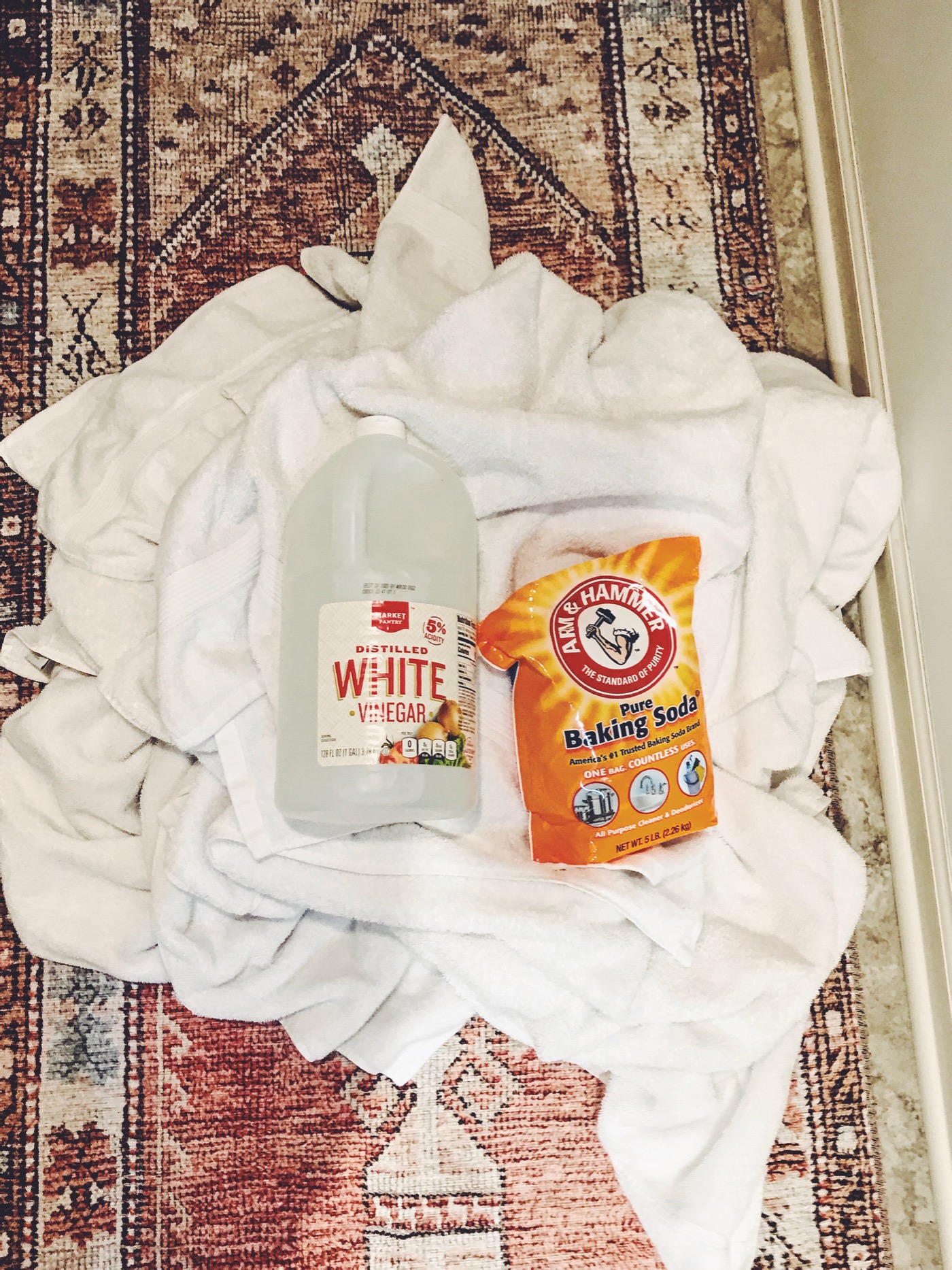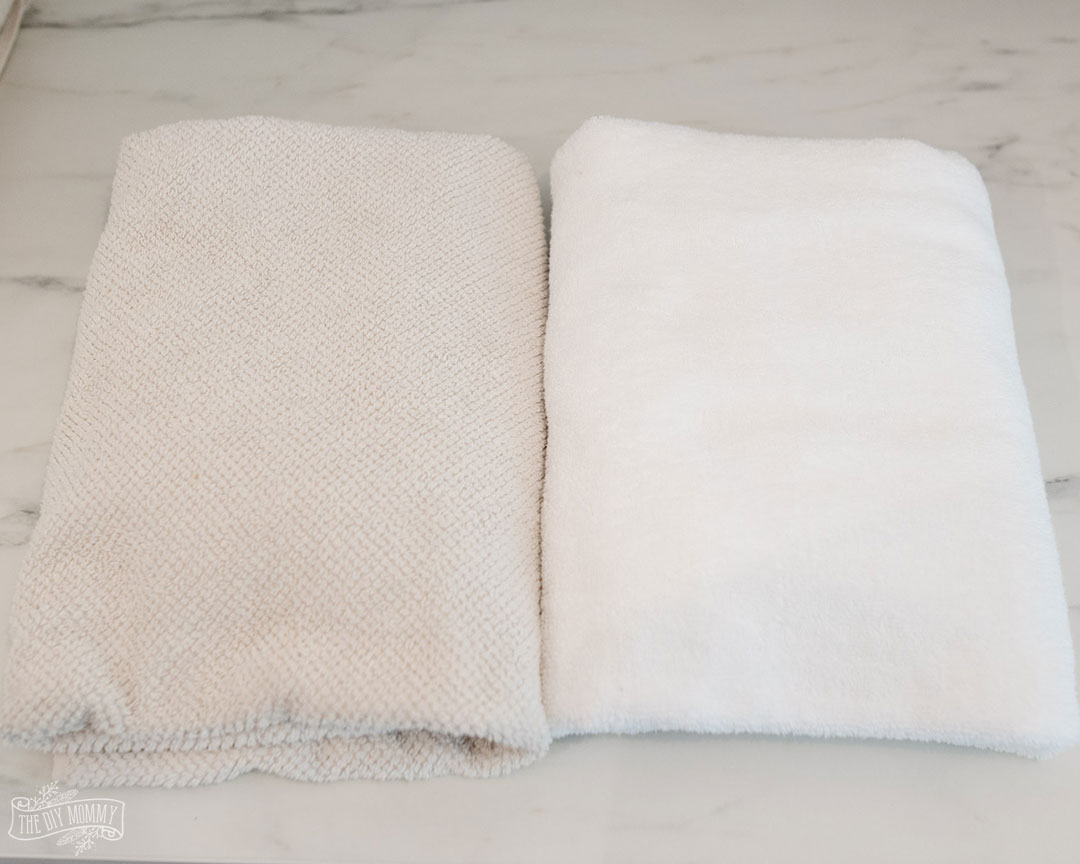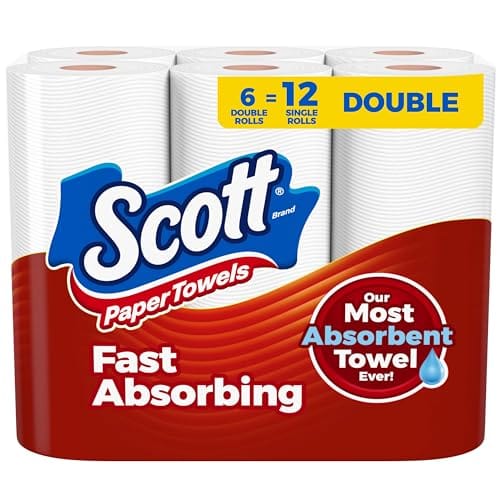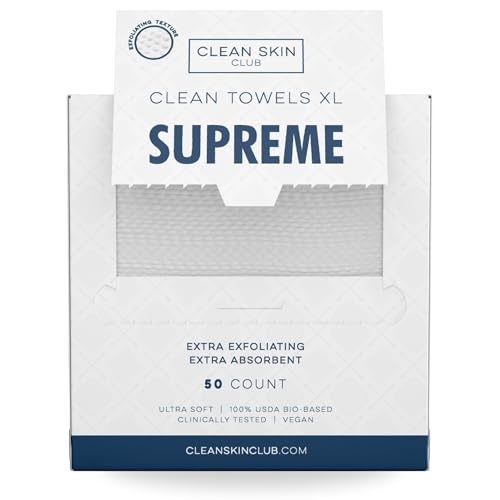To get towels white again, soak them in a mixture of hot water, baking soda, and vinegar. Then, wash with a regular detergent.
- Introduction To Bright Towels
- Pre-wash Practices
- Choosing The Right Detergent
- The Power Of Bleach
- Boosting Brightness With Baking Soda
- Harnessing The Sun's Natural Bleaching Effect
- Maintenance Tips For Lasting Whiteness
- Troubleshooting Common Issues
- Eco-friendly Whitening Methods
- When To Replace Your Towels
- Frequently Asked Questions
- Conclusion
Towels often lose their brightness and become dingy over time. Proper care can restore their original whiteness. Start by soaking the towels in hot water mixed with baking soda and vinegar. This combination helps break down residue and remove stains.
After soaking, wash the towels in the washing machine using a regular detergent. For extra whitening, add a bit of hydrogen peroxide or bleach to the wash cycle. Dry the towels thoroughly in the sun or a dryer. With these simple steps, your towels will look fresh and white again.

Introduction To Bright Towels
Everyone loves fresh, bright white towels. They give a clean, luxurious feel. Keeping them white can be hard, though. Over time, towels can turn yellow or gray. This happens due to many reasons. But, you can make them white again with some simple tips. Let’s dive into how you can achieve this.
The Appeal Of White Towels
White towels symbolize cleanliness and elegance. They brighten up your bathroom. Many hotels use white towels for this reason. They look fresh and inviting. White towels also match any bathroom decor. This makes them a versatile choice. They are easy to bleach if they get stained. This keeps them looking new for a long time.
Common Causes Of Towel Discoloration
Several factors cause towel discoloration. Here are the most common ones:
- Hard Water: Minerals in hard water can make towels dull.
- Detergent Build-Up: Using too much detergent leaves residue.
- Body Oils and Lotions: These can leave yellow stains on towels.
- Improper Washing: Not washing towels correctly can cause discoloration.
Understanding these causes helps in preventing discoloration. Now, you can take steps to keep your towels white and bright.
Pre-wash Practices
To get your towels white again, start with pre-wash practices. These steps prepare your towels for the washing machine. They help remove stains and dirt effectively.
Sorting Laundry Effectively
First, sort your laundry by color and fabric type. Keep white towels separate from colored ones. This prevents color bleeding and ensures better cleaning.
- Separate white towels from colored towels.
- Group towels by fabric type.
Using a laundry basket with dividers can help. It makes sorting faster and easier.
Pre-treating Stained Towels
Next, pre-treat any stains on your towels. Apply a stain remover directly to the stained areas. Let it sit for a few minutes.
- Identify stained areas on the towels.
- Apply a stain remover to the stains.
- Allow the remover to sit for 5-10 minutes.
For tough stains, use a mixture of baking soda and water. Rub it gently on the stain before washing.
Choosing The Right Detergent
Selecting the right detergent is crucial for keeping your towels white. The right detergent can remove stains and keep towels bright.
In this section, we’ll explore which detergents work best for white fabrics. We’ll also compare natural and chemical detergents.
Detergents For White Fabrics
Detergents for white fabrics contain special agents. These agents help in keeping the towels white and clean.
Optical brighteners are common in these detergents. They make the towels look whiter by reflecting light.
Enzyme-based detergents are another good option. They break down stains and dirt effectively.
| Detergent Type | Benefits |
|---|---|
| Optical Brighteners | Makes towels look whiter |
| Enzyme-based | Breaks down stains and dirt |
| Bleach | Removes tough stains |
Natural Vs. Chemical Detergents
Natural detergents are made from plants and minerals. They are eco-friendly and safe for sensitive skin.
Chemical detergents often contain synthetic ingredients. They are very effective in removing tough stains.
Here’s a quick comparison:
- Natural Detergents: Eco-friendly, gentle on skin, less harsh
- Chemical Detergents: Highly effective, strong stain removal, not always eco-friendly
Choose the one that best fits your needs. Both types have their own pros and cons.
The Power Of Bleach
Bleach is a powerful tool for getting towels white again. It removes stubborn stains and disinfects. But using bleach safely is crucial. Let’s explore how to use bleach effectively.
Safely Using Chlorine Bleach
Chlorine bleach can be harsh. Always wear gloves to protect your skin. Use bleach in a well-ventilated area. Never mix bleach with other cleaning products. This can create toxic fumes.
Add bleach to your washing machine’s bleach dispenser. Follow the manufacturer’s instructions. Use the right amount. Too much bleach can damage towels. Use hot water for the best results. Hot water activates the bleach, making it more effective.
Here’s a simple table for quick reference:
| Steps | Details |
|---|---|
| Wear Gloves | Protect your hands |
| Ventilate Area | Open windows for airflow |
| Use Bleach Dispenser | Follow machine instructions |
| Measure Correctly | Prevent towel damage |
| Use Hot Water | Activate the bleach |
Alternatives To Chlorine Bleach
Not everyone likes chlorine bleach. Some prefer gentler options. Consider these alternatives:
- Hydrogen Peroxide: Mix with water. Use as bleach substitute.
- White Vinegar: Add to wash cycle. Naturally whitens and softens.
- Lemon Juice: Use in sunlight. Natural bleaching agent.
These alternatives are eco-friendly. They are also less harsh on fabrics. Always test on a small area first. Ensure no damage or discoloration occurs.
Boosting Brightness With Baking Soda
Baking soda is a powerful tool for making towels white again. It’s a natural cleaner and deodorizer. This section will show you two methods to use baking soda. Your towels will sparkle and smell fresh.
Baking Soda In The Wash Cycle
Adding baking soda to your wash cycle is easy. Follow these steps:
- Put your white towels in the washing machine.
- Add your regular amount of detergent.
- Sprinkle half a cup of baking soda over the towels.
- Start the machine on a hot water cycle.
The baking soda will boost the detergent’s power. It will break down stains and odors. Your towels will come out whiter and fresher.
Creating A Baking Soda Soak
If your towels need extra help, try a baking soda soak. This method is simple and effective:
- Fill a large bucket or sink with warm water.
- Add one cup of baking soda.
- Stir the water until the baking soda dissolves.
- Place the towels in the solution.
- Let them soak for a few hours or overnight.
- After soaking, wash the towels as usual.
The baking soda soak will loosen deep stains. It will also deodorize the towels. This method is great for very dirty towels.

Harnessing The Sun’s Natural Bleaching Effect
Getting towels white again can feel challenging. Harnessing the sun’s natural bleaching effect is an effective method. The sun’s UV rays help break down stains and whiten fabrics. This natural process is simple, eco-friendly, and cost-effective.
Tips For Sun-drying Towels
- Lay towels flat on a clean surface. This ensures even exposure.
- Hang towels on a clothesline. This allows for proper air circulation.
- Rotate towels throughout the day. This ensures all sides get sunlight.
- Choose a sunny day with low humidity. This speeds up the drying process.
- Use light-colored clothes pegs. This avoids any color transfer to your towels.
Precautions For Outdoor Drying
- Avoid drying towels on dirty surfaces. Clean areas prevent additional stains.
- Bring towels inside before sunset. Dampness can cause mildew.
- Watch for bird droppings. Cover towels with a mesh net if needed.
- Monitor weather conditions. Rain can undo your efforts.
- Keep an eye on windy days. Secure towels to prevent them from blowing away.
Maintenance Tips For Lasting Whiteness
Keeping towels white can be challenging. With these maintenance tips, your towels will stay bright and fresh. Follow these guidelines to ensure lasting whiteness for your towels.
Regular Washing Routines
Regular washing keeps towels white. Wash towels every three to four days.
- Use hot water for a deeper clean.
- Add baking soda to the wash cycle.
- Use white vinegar instead of fabric softener.
Separate white towels from colored ones. This prevents color bleeding and maintains whiteness.
Choose a detergent designed for whites. This ensures your towels remain bright and clean.
Proper Storage Solutions
Store towels in a dry, ventilated space. This helps prevent mildew and odors.
- Ensure towels are completely dry before storing.
- Use shelves or baskets to keep towels organized.
- Avoid storing towels in humid areas.
Rotate your towels regularly. Use each towel equally to prevent excessive wear on any one towel.
Consider using sachets of dried lavender or cedar chips. These keep towels smelling fresh and deter pests.
| Tip | Benefit |
|---|---|
| Wash with baking soda | Removes odors |
| Use white vinegar | Softens towels |
| Store in dry area | Prevents mildew |
Troubleshooting Common Issues
Keeping towels white can be a challenge. Various issues can turn them dull. Here, we troubleshoot common problems. Let’s bring the sparkle back to your towels!
Dealing With Stubborn Stains
Stains can be tricky to remove. Try these steps:
- Soak the towels in hot water.
- Add a cup of white vinegar.
- Let them soak for an hour.
- Wash with a gentle detergent.
If the stain persists, use baking soda. Sprinkle baking soda on the stain. Scrub gently with a toothbrush. Wash the towel again. Repeat if needed.
Reviving Yellowed Towels
Yellowing can happen over time. Follow these methods:
- Fill a basin with hot water.
- Add a cup of hydrogen peroxide.
- Soak the towels for 30 minutes.
- Rinse and wash as usual.
Another method uses lemon juice. Mix lemon juice with water. Soak the towels for an hour. Dry them in the sun for added whitening.
| Method | Ingredients | Soaking Time |
|---|---|---|
| Vinegar Soak | White Vinegar | 1 hour |
| Baking Soda Scrub | Baking Soda | Scrub and Wash |
| Peroxide Soak | Hydrogen Peroxide | 30 minutes |
| Lemon Juice Soak | Lemon Juice | 1 hour |
These methods help revive and whiten your towels. Try them for fresh, clean towels every time.
Eco-friendly Whitening Methods
Keeping towels white can be challenging. Harsh chemicals often damage the fabric. Eco-friendly methods provide a safe and effective solution. These methods use natural ingredients. They are gentle on towels and the environment.
Using Vinegar And Lemon
Vinegar and lemon are powerful natural whitening agents. They are safe and effective. Vinegar helps remove stains and deodorizes. Lemon adds a fresh scent and boosts whitening power.
Here’s a simple method using vinegar and lemon:
- Fill a basin with hot water.
- Add one cup of white vinegar.
- Squeeze the juice of two lemons into the water.
- Soak the towels for an hour.
- Wash the towels as usual.
Repeat this method once a month. Your towels will stay bright and fresh.
Environmentally Safe Whitening Products
Several environmentally safe whitening products are available. These products are free from harsh chemicals. They use natural ingredients. Here is a comparison table of some popular products:
| Product | Ingredients | Benefits |
|---|---|---|
| Eco White Laundry Powder | Oxygen bleach, baking soda | Removes stains, brightens fabric |
| Green Clean Whitening Gel | Hydrogen peroxide, essential oils | Whitens, freshens |
| Nature’s Bright Boost | Lemon extract, vinegar | Deodorizes, whitens |
Choose a product that suits your needs. Follow the instructions on the package for the best results.

When To Replace Your Towels
Towels are essential for our daily hygiene. But over time, they wear out. Knowing when to replace your towels keeps your bathroom fresh and clean. Let’s dive into the key signs and sustainable ways to dispose of old towels.
Signs Of Wear And Tear
How do you know if your towels are past their prime? Here are some telltale signs:
- Fraying edges: If the edges are unraveling, it’s time.
- Thin spots: Hold your towel up to the light. Thin spots mean it’s worn out.
- Fading colors: Bright colors fading? Your towel is aging.
- Odor: Persistent bad smells even after washing? Time to replace.
- Less absorbent: A towel that no longer absorbs water efficiently needs replacing.
Sustainable Disposal Of Old Towels
Don’t just throw old towels in the trash. There are sustainable ways to dispose of them:
- Donate: Many animal shelters need old towels. They use them for bedding and cleaning.
- Recycle: Some recycling programs accept textiles. Check your local options.
- Repurpose: Old towels can become cleaning rags or car wash cloths.
Recycling old towels helps the environment. It reduces waste and gives your old towels a new life.
| Signs of Wear | Action |
|---|---|
| Fraying edges | Replace |
| Thin spots | Replace |
| Fading colors | Replace |
| Odor | Replace |
| Less absorbent | Replace |
Keep an eye on your towels. Replace them as needed. This ensures your bathroom stays fresh and inviting.
Frequently Asked Questions
How Can I Make My Towels White Again?
To make towels white again, use a mixture of baking soda and vinegar. Wash with hot water for best results.
What Causes Towels To Lose Their Whiteness?
Towels lose whiteness due to detergent residue, fabric softeners, and minerals in water. Regular washing with hot water helps.
Can Bleach Be Used To Whiten Towels?
Yes, bleach can whiten towels. Use it sparingly to avoid fabric damage. Always follow care instructions.
Are There Natural Ways To Whiten Towels?
Yes, natural methods include using lemon juice, baking soda, and white vinegar. They are effective and safe.
Conclusion
Achieving bright, white towels is simpler than you think. Use natural cleaners and proper washing techniques. Regular maintenance prevents stubborn stains. Keep your towels fresh and long-lasting with these easy tips. Enjoy the comfort of pristine, white towels in your daily routine.
Don’t forget to share these useful tips with friends and family.


